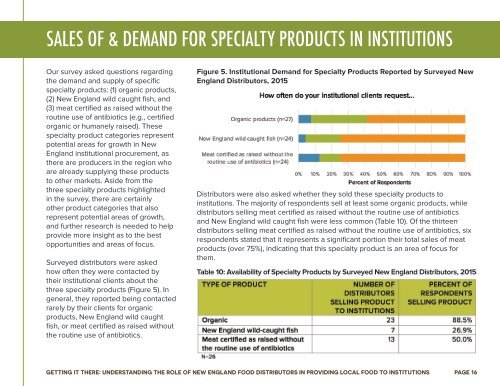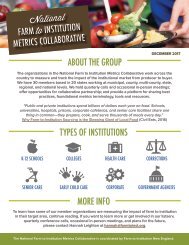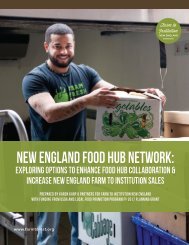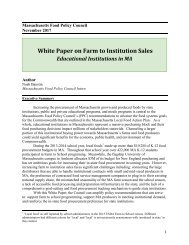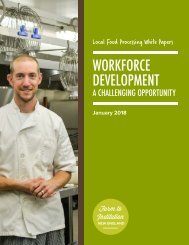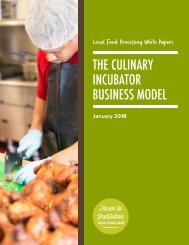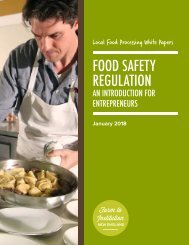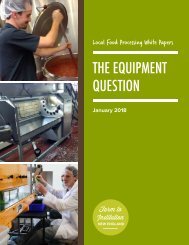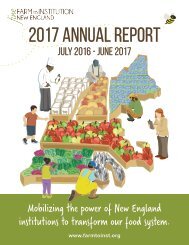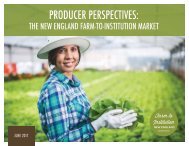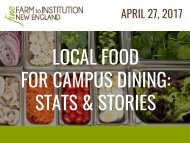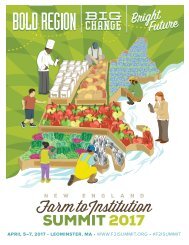FINE Distributor Report
“Getting it There: The Role of New England Food Distributors in Providing Local Food to Institutions” presents in-depth findings and makes specific, data-based recommendations for food distributors (including food hubs) as well as government officials, funders and institutions. The report is based on an original survey answered by over 60 food distributors across New England in the spring of 2015.
“Getting it There: The Role of New England Food Distributors in Providing Local Food to Institutions” presents in-depth findings and makes specific, data-based recommendations for food distributors (including food hubs) as well as government officials, funders and institutions. The report is based on an original survey answered by over 60 food distributors across New England in the spring of 2015.
Create successful ePaper yourself
Turn your PDF publications into a flip-book with our unique Google optimized e-Paper software.
SALES OF & DEMAND FOR SPECIALTY PRODUCTS IN INSTITUTIONS<br />
Our survey asked questions regarding<br />
the demand and supply of specific<br />
specialty products: (1) organic products,<br />
(2) New England wild caught fish, and<br />
(3) meat certified as raised without the<br />
routine use of antibiotics (e.g., certified<br />
organic or humanely raised). These<br />
specialty product categories represent<br />
potential areas for growth in New<br />
England institutional procurement, as<br />
there are producers in the region who<br />
are already supplying these products<br />
to other markets. Aside from the<br />
three specialty products highlighted<br />
in the survey, there are certainly<br />
other product categories that also<br />
represent potential areas of growth,<br />
and further research is needed to help<br />
provide more insight as to the best<br />
opportunities and areas of focus.<br />
Surveyed distributors were asked<br />
how often they were contacted by<br />
their institutional clients about the<br />
three specialty products (Figure 5). In<br />
general, they reported being contacted<br />
rarely by their clients for organic<br />
products, New England wild caught<br />
fish, or meat certified as raised without<br />
the routine use of antibiotics.<br />
Figure 5. Institutional Demand for Specialty Products <strong>Report</strong>ed by Surveyed New<br />
England <strong>Distributor</strong>s, 2015<br />
<strong>Distributor</strong>s were also asked whether they sold these specialty products to<br />
institutions. The majority of respondents sell at least some organic products, while<br />
distributors selling meat certified as raised without the routine use of antibiotics<br />
and New England wild caught fish were less common (Table 10). Of the thirteen<br />
distributors selling meat certified as raised without the routine use of antibiotics, six<br />
respondents stated that it represents a significant portion their total sales of meat<br />
products (over 75%), indicating that this specialty product is an area of focus for<br />
them.<br />
Table 10: Availability of Specialty Products by Surveyed New England <strong>Distributor</strong>s, 2015<br />
GETTING IT THERE: UNDERSTANDING THE ROLE OF NEW ENGLAND FOOD DISTRIBUTORS IN PROVIDING LOCAL FOOD TO INSTITUTIONS PAGE 16


